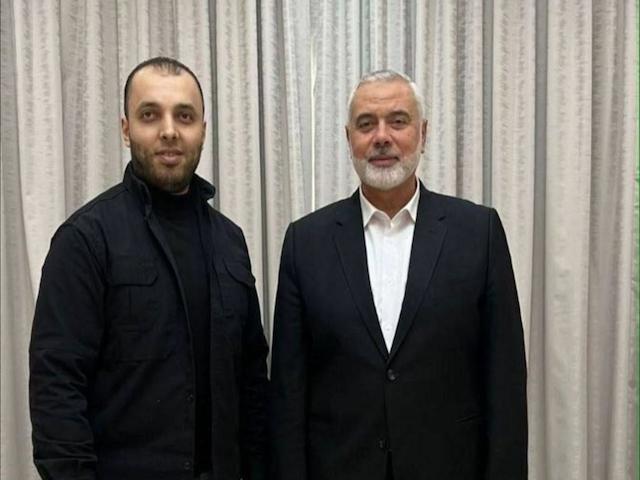In an unprecedented turn of events, Tehran, Iran's bustling capital, experienced a night of startling contrasts on July 30. The day had been marked by the inauguration of President Masoud Pezeshkian, an event that drew high-profile foreign delegations and was celebrated with grandeur. The city's air was filled with the promise of a new political chapter. However, the tranquility of the night was shattered at precisely 1:45 a.m., when a deafening explosion echoed through the affluent northern district, sending shockwaves across Tehran and beyond.
By dawn, the startling truth was unveiled: Ismail Haniyeh, the prominent leader of the Palestinian Hamas political bureau, had been killed in a daring drone strike. Iranian authorities swiftly confirmed the dire news. This revelation plunged the city into a state of high alert and intense speculation.
Iran's Revolutionary Guards Confirm Attack
In an official statement, Iran's Revolutionary Guards disclosed that Haniyeh's "residence" was the target of the strike, resulting in the immediate death of the Hamas leader and one of his security personnel. The statement emphasized that an investigation was underway to uncover the full details and circumstances of this audacious attack.
Iranian media reports that a bodyguard of Ismail Haniyeh leaked critical information leading to his assassination.
— Aviva Klompas (@AvivaKlompas) July 31, 2024
According to the report, an Israeli-made Spike short-range missile targeted Haniyeh's bedroom. The missile was launched from a building close to where the Hamas… pic.twitter.com/lRN02pI1ao
Preliminary findings from Iranian authorities suggest that the drone, which penetrated Haniyeh's room, acted on intelligence provided by an insider within his close protection team. Sky News Arabic, citing Iranian sources, reported that a missile launched from a nearby building struck the location where Haniyeh was staying, highlighting the precision and boldness of the operation.
Unplanned Overnight Stay and Connections to Other Assassinations
Haniyeh had traveled to Tehran to participate in President Masoud Pezeshkian's inauguration. According to Amwaj.media, an Arab news outlet based in London, the Hamas political bureau chief was not initially scheduled to stay overnight. Speculation arose that he may have extended his visit to discuss the fallout from the assassination of Hezbollah's senior official, Fouad Shukr, which occurred on the same night.
Security Breach at the Saadabad Complex
A senior Iranian source informed Arab media that Haniyeh and other high-profile foreign dignitaries attending the inauguration were accommodated at the prestigious Saadabad Complex, a location synonymous with the presidency. An attack within this highly secured area would be seen as a brazen act, raising serious concerns about security breaches.
Reports indicate that following the assassination, Iran's Supreme National Security Council convened an emergency session. A senior official attending the meeting revealed suspicions of complicity within Haniyeh's inner security circle, particularly his bodyguards. Tehran's initial assessment pointed to a small drone being used in the attack, based on intelligence reportedly supplied by Haniyeh's own security team.
Haniyeh's bodyguard leaked info that lead to his assassination - reporthttps://t.co/vehaB6wzPa
— i24NEWS English (@i24NEWS_EN) July 31, 2024
Unverified Claims and Unusual Circumstances
It is important to note that the media outlet could not independently verify these claims. However, if Haniyeh was indeed residing at the Saadabad Complex, it underscores two significant anomalies. First, Hamas leaders typically lodge at their residences on Nelson Mandela Boulevard when in Tehran. Second, a security source asserted that Haniyeh's overnight stay was unexpected, given previous threats against his life by Israel.
Implications and Speculations
This dramatic and high-profile assassination has left many questions unanswered. The implications for regional politics and security are profound, as Tehran grapples with the audacity of the attack and the potential breach within its security apparatus. As investigations continue, the international community watches closely, anticipating the ripple effects of this extraordinary event.
*Iran Calls Emergency Meeting Following Hamas Chief’s Assassination*
— The Jewish Voice (@TJVNEWS) July 31, 2024
Hamas leader Ismail Haniyeh was assassinated in Tehran during a visit for Iran's new president's swearing-in. The airstrike, which evaded advanced defenses, killed Haniyeh and his bodyguard. Iran blames Israel,… pic.twitter.com/XR9wv1vYAH
The elimination of Ismail Haniyeh in such a bold manner not only exposes the vulnerabilities within Iran's security but also highlights the lengths to which adversaries are willing to go to strike at their targets. As the dust settles, the world awaits further revelations from Tehran, which may shape the geopolitical landscape in the months to come.


